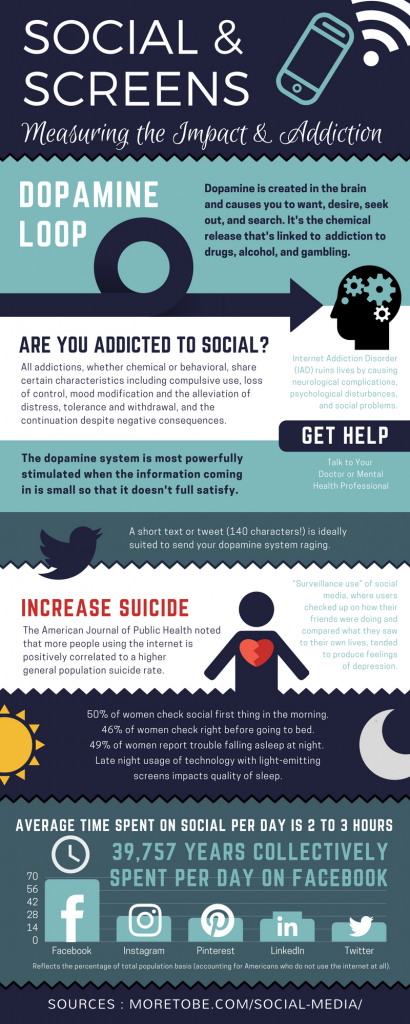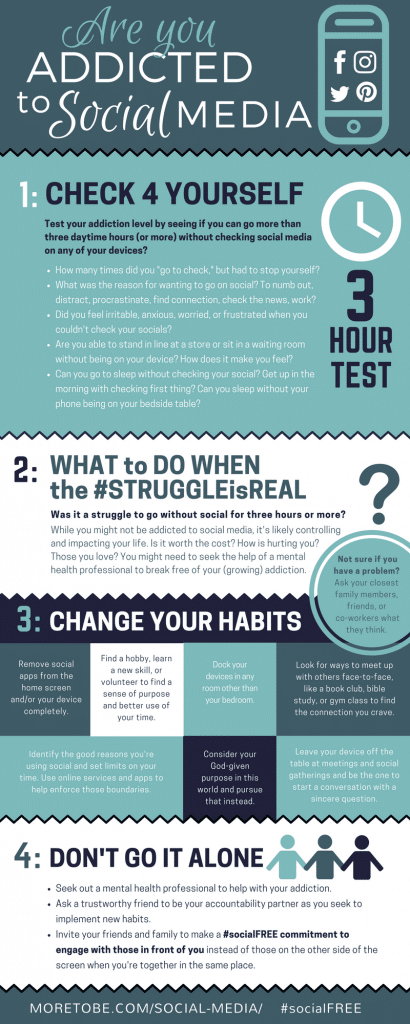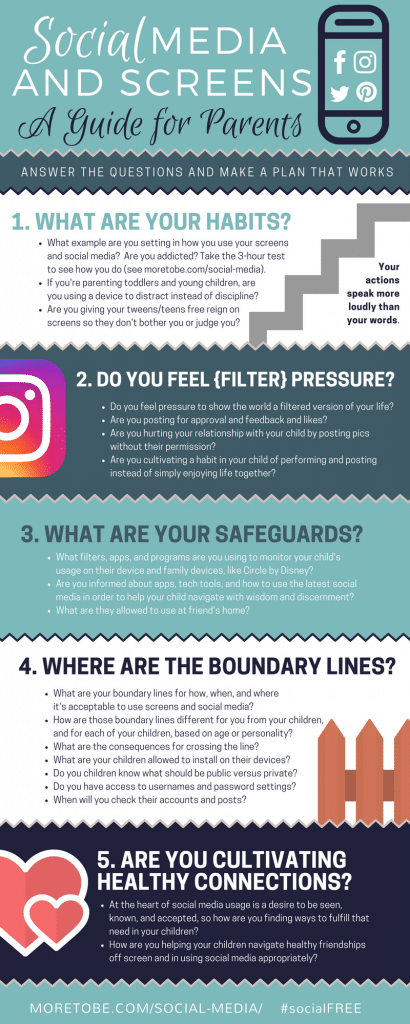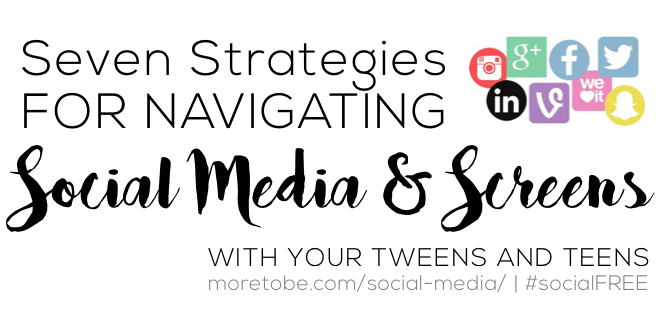Are you aware of the way social media and screen-based devices are impacting our lives?
Have you noticed the way they have reshaped our habits in the last decade? Millennials don’t know a world without a personal device and social media connections.
Screens and social media have become our norm, but have we paused to consider the impact on our lives?
Are they helping or hurting relationships?
Are they growing us personally and developing us intellectually?
Are they depleting our brains cells and fatiguing our souls?
Are they enriching our lives with deeper connections or making us feel more isolated than ever before?
Are they increasing our anxiety, depression, and suicide rates?
Are they leading to a better quality of life for us and the next generation?
The research on the uses of screen-based technology and social media is still fresh. The ink isn’t yet dry because it’s not been around long enough to measure the impact on an entire generation. However, it’s not worth dismissing the fact that we as individuals, and our world at large, are significantly impacted by the use of screen-based technology and social media.

We can feel the impact in our marriages and family dynamics as the tension between a screen-free conversation and one in which the person in the room plays second fiddle to the one on the other end of a social account exists.
We can look at the state of emotional health and rise in suicide and at least ask the question: Is this related to the overwhelming stimulation of social media and the constant bombardment of likes and dislikes, friending and unfriending, and following and blocking that takes place daily?
The impact of screens and social media may not be fully measurable, but it is markedly noticeable.
Thanks to the chemical release of dopamine in our brain, which is released when we use social media and screen-based technology, our habits are more like addictions. Yes, the same kind of addictions experienced by those who gamble, drink, and do drugs.
So why are we using social media and screens without any boundary lines?
If we wouldn’t hand a teenager a drink or a joint, why are we giving them unrestricted access to social media on a device that is proven to elicit an addictive response?
So the real questions before us are these . . .
How can we manage our screens and social media in an emotionally (and spiritually) healthy way instead of allowing them to manage us?
What is God’s perspective on how we use our devices and social media? Have they become idols? Distractions? Tools for numbing out instead of seeking holy healing?
What boundaries do we need to put in place on usage?
Which unhealthy habits do we need to replace with intentionally healthy ones?
As we embrace this conversation and evaluation for ourselves, we really have to think about the impact on the next generation.
How can we be intentional about passing onto them . . . a generation that has never experienced life without a screen or social media . . . habits that will sustain emotional health, spiritual growth, and life-giving relationships?
“This generation is alone. They have 1,000 friends, but they are alone,” said Adam Donyes, a certified biblical counselor who works exclusively with teens and young people. Donyes is the founder and president of Link Year, a one-year Christian program for post-high-school teens. He said the more time he spends with young people, the more he sees social media’s impact on rising rates of depression and suicide. And he believes the impact is greater on girls.
Selective posting, editing, and one-click affirmation are resulting in young people who are isolated, operating in a shallow world of highlights and touched-up photos, Donyes said. “You and I know that we are wired for community. … When we are not having that, there is going to be depression,” he said. “When we are not known by anybody, we lack purpose.” From World.wng.org

We’ve yet to see or know the full impact of a world immersed in screen-based technology and social media connection. Yes, there is certainly good within its fabric — connecting people together from across the miles and providing helpful information and encouragement with one click. But like all good things, misuse can lead to devastation.
What if we stopped living in bondage to screens and social media and instead created a culture in which we choose to be #socialFREE?
What if we made a commitment to connect first with those in our midst . . . at the table and on the couch, in the car and at the meeting, in our pews and at our gatherings . . . and left the devices out for a bit?
What if we demoted our devices to second place tools instead of first place distractions?
What if those life-giving connections found on social were the overflowing parts of our already full life rather than the places that suck us too dry to give to those we do life with daily?
Friend, if you’ve read this far, I’m sure you care about this topic deeply. I encourage you to pursue the next steps by evaluating your habits and educating yourself on the implications of living in a screen-based world steeped in social media connections. This list of sources will get you started.
Educate Yourself {Sources of InfoGraphic Stats}*
*Disclaimer: We do not necessarily support the worldview or the philosophical perspective of each of these recommended sites or agencies, nor do we endorse any product or service they are advertising or selling. However, we do believe there is information contained within each of these links that is relevant to understand the impact of technology and social media addiction and use.
- Millennials in the Workplace, Simon Sinek
- 5 Ways Social Media is Changing Your Brain
- Psychology Today: Why We’re All Addicted to Texts, Twitter, and Google
- Social Media Today Infographic
- Pew Internet: Teens, Social Media, and Technology Overview 2015
- Pew Internet: Social Media Update 2016
- Pew Internet: Social Media Fact Sheet
- Barna Research: Women Report Mixed Feelings on Social Media
- Culture and Youth: Social Media and Depression
- It’s Digital Heroin: How Screens Turn Kids into Psychotic Junkies
- World: The Link Between Social Media and Suicide in Young Women
- Fox News: Is Social Media Fueling a National Epidemic in Teen Suicide
- CBS News: How Real a Risk is Social Media Addiction
- NCBI: Internet Addiction, A Brief Summary of Research and Practice
- Sleep Foundation: Lack of Sleep Affecting Americans
- Sexting: What Parents Need to Know
- StopBullying.gov
- The Center for Internet and Social Addiction
- Technology Addiction Test for Children
- Fortnite, Boys, and Self-Control

But don’t stop with only educating yourself. Take the appropriate measures to change your habits and safeguard your family. These tools and techniques will help you get started:
Make Immediate Changes
- Keep all screens out of bedrooms, especially at bedtime.
- Dock devices in a public space.
- Use an alarm clock instead of a phone.
- Move social media apps off home screens of devices or delete all together.
- Keep a basket by the kitchen or dining room table and in the TV room to drop devices while spending time together.
- Set limits on usage of screens.
- Seek out accountability partners and share reports (see below) of time usage.
- Pursue a hobby, skill, or volunteer, and invite a friend or family member to join you.
- Find a way to connect with people face-to-face, like a book club, bible study, or joining a gym.
Use the Tools
- Focus on the Family – Find a counselor to help with an addiction.
- Circle by Disney – Manage content and time across devices.
- Rescue Time – Become aware of how you spend time on your computer.
- Social Media Examiner – Be informed about the ways social media is being used in the marketplace.
- Center for Parent and Youth Understanding (CPYU) – Source of information for parenting tweens and teens.
 Create a Family Plan
Create a Family Plan
Grab a copy of Seven Strategies for Navigate Social Media and Screens with Your Tweens and Teens workbook for developing a plan that works for your family.
[purchase_link id=”22710″ text=”Add to Cart” style=”button” color=”dark-gray”]


